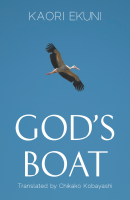 Author: Kaori Ekuni
Author: Kaori Ekuni
Translator: Chikako Kobayashi
U.K. publisher: Thames River Press
ISBN: 9780857282491
Released: December 2012
Original release: 1999
One of my favorite books that I’ve read in the past few years is Kaori Ekuni’s debut and award-winning novel Twinkle Twinkle. Because I enjoyed it to such a great extent, I made a point to seek out more of Ekuni’s work to read. Sadly, God’s Boat is currently her only other major work to have been released in English. The novel was originally published in Japan in 1999. Later it was selected as a part of the Japanese Literature Publishing Project—an effort to promote the publication of modern Japanese works in translation across the globe. The English translation of God’s Boat by Chikako Kobayashi was released in 2012 by Thames River Press, a publisher based in the United kingdom. Ekuni is a respected author in Japan and has won several prestigious awards for her work. However, she doesn’t seem to be very well-known among English-reading audiences, which is a shame. I wish that more of Ekuni’s work was available in translation; her writing is excellent.
Yoko Najima lives alone with her young daughter Soko. She left her husband soon after Soko was born as the result of a passionate love affair. To make ends meet, Yoko teaches piano and works at bars and restaurants. There are three things that she counts as true treasures in her life: piano, Soko, and Soko’s father. But he has disappeared and has been gone for nearly a decade, promising that one day he will return for her. Without him by her side, Yoko feels like she doesn’t belong anywhere. Every few years she moves from one place to another with Soko in tow, afraid that if she gets too comfortable and begins to blend with her surroundings he will never find her. Yoko and Soko drift along together in life, but as Soko grows older she becomes weary of the process of moving and starting over again and again. She wants to make some lasting friendships, establish roots, and find stability. But her mother yearns for nothing more than to be reunited with Soko’s father. She is desperate to see him once more.
Much like Twinkle Twinkle, the narrative of God’s Boat alternates between two, not quite stream-of-consciousness, perspectives. The story gently progresses, at times seen through Yoko’s eyes and at others seen through Soko’s. God’s Boat paints a very intimate portrait of these two women and of their relationship with each other. A little at a time, their most private thoughts and personal memories are revealed, creating a framework from which Ekuni explores themes of love, family, grief, and loss. The novel begins in 1997, when Soko is nine years old, and ends in 2004, following them from Takahagi, to Sakura, to Zushi, and then finally to Tokyo. Yoko doesn’t change much as the novel progresses, but Soko grows significantly as she matures from a child into a young woman, which forces her relationship with her mother to evolve as well. In part, God’s Boat is Soko’s coming-of-age story as she learns to cope with her mother’s eccentricities while living under the shadow of a father she never knew.
In the epilogue, Ekuni states that while God’s Boat “is simple and quiet, the tale is one of madness. Even now I believe it to be the most perilous novel I’ve written thus far.” For the most part, God’s Boat is a very straightforward narrative about the everyday lives of its characters. The madness that Ekuni refers to is subtle, more obvious in retrospect but present from the very beginning of the novel. At first, God’s Boat is fairly unassuming, but tension slowly builds as Soko matures until the novel takes a sudden and devastating turn near its conclusion when the precarious state of Yoko’s mental and emotional stability is laid completely bare. Looking back, the developments aren’t so surprising—eventually reality must invade the romanticized existence that Yoko has created for herself and her daughter. Even so, I was not expecting God’s Boat to be nearly as hard-hitting and emotionally wrenching as it ends up being. The novel is one that will stick with me for quite some time, a testament to Ekuni’s skill as an author.

